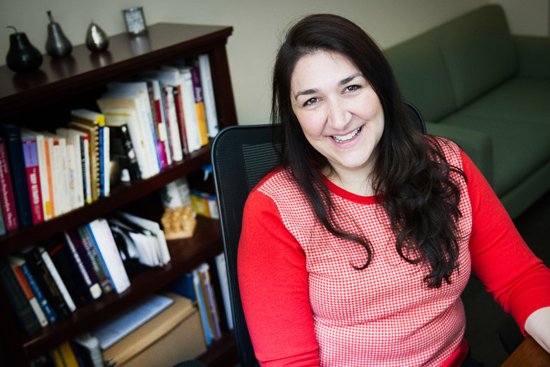A New Leader for Behavioral Medicine
Carrie Landa named to permanent post

Carrie Landa, the new director of Behavioral Medicine at Student Health Services, says that one of her responsibilities is to continue to decrease the stigma that surrounds mental illness. Photo by Jackie Ricciardi
Carrie Landa, who has been serving as interim director of Behavioral Medicine at Student Health Services (SHS) since Margaret Ross stepped down from the post in January, has been officially appointed director of the department. In that role, Landa will oversee a staff of 17 psychiatrists, psychologists, clinical nurse specialists, licensed mental health counselors, and a patient care coordinator, as well as several trainees.
A former senior staff psychologist with Behavioral Medicine, Landa is well aware of the growing demand for mental health services on college campuses. According to the 2013 American College Health Association’s National College Health Assessment survey, nearly 32 percent of students reported feeling “so depressed that it was difficult to function.” The 2012 Healthy Minds Study, an annual national online survey of college students conducted by the University of Michigan, revealed that 20 percent of Boston University students screened positive for depression or anxiety.
“College health is constantly changing, and the demand for behavioral health services is only getting higher,” Landa says, pointing to numbers in her own department by way of illustration. During the 2013–2014 school year, Behavioral Medicine had 11,282 visits, a significant increase from the 8,396 visits that took place during the 2007–2008 school year.
“The challenges that SHS faces in the realm of behavioral medicine are the ever-increasing number and the severity of mental health issues within our student population, and how best to manage that with limited resources,” says David McBride, outgoing director of Student Health Services and a School of Medicine assistant professor of family medicine. He says that Landa is uniquely qualified to meet those challenges, citing her numerous achievements, including assisting in the department’s accreditation process, developing procedures for onboarding new employees, and establishing alliances with important colleagues in the BU community.
“Carrie’s engaging style has made her a hit at new student orientation, where she has been able to connect with incoming students,” says McBride. “Her clinical care is top notch, and she is respected by her peers as an excellent clinician.”
“Carrie has wonderful leadership qualities and a great capacity for working with others, and she’s become known on campus as someone who is approachable and thoughtful,” says Ross, who now serves as medical director at BU’s Center for Anxiety & Related Disorders. “She’s a profoundly gifted administrator, very quick, and is able to pull together a lot of information and distill the critical pieces that will help guide the department going forward.”
Landa says her new job will require her to wear two different hats, as an administrator and as a clinician. In the first, she’ll be responsible for managing the Behavioral Health staff and assessing the mental health needs of the University’s student population. That means raising awareness of mental health services for students on campus and collaborating with student organizations, faculty, and offices across campus, including Disability Services, Residence Life, academic departments, and the University Service Center.
As a clinician, Landa will continue to regularly see students with a variety of mental health issues, including depression, anxiety, and eating disorders, which she describes as “rampant” on college campuses. Landa notes that given the age of the student population, this is also “the time when there’s the occurrence of first episodes of some mental illnesses, such as schizophrenia and bipolar disorder.”
“We also see normative developmental stressors, like anxiety about performance in classes and career choices, developmental changes around relationships, and breakups and family,” she says, noting that hurdles such as finding a job, increased college costs, and family and academic pressures further complicate college life.
“Stress is normal and we all have days when we feel overwhelmed,” says Landa. “But when stress begins to affect day-to-day functioning, when you’re not able to carry out tasks that are required, when stress is becoming distress, then something needs to be done. That’s when it’s important for students to reach out to Behavioral Medicine.”
Even when referred to the office by a friend or professor, students are sometimes hesitant to seek out help, Landa says. The reason? “Students come here with 18 years’ experience, and with that they bring their own opinions informed by their own cultures and families. So we might be doing a really good job of de-stigmatizing mental health issues on our campus, but individuals maintain their own beliefs. I think part of what helps students who are struggling is knowing that others are too—they are not alone.”
Landa earned her undergraduate degree at the University of New Hampshire, and her master’s degree and PhD at Suffolk University, where her research focused on eating disorders in college and sorority women, and individuals who have siblings with disabilities. She joined SHS’s Behavioral Medicine staff in 2009.
Comments & Discussion
Boston University moderates comments to facilitate an informed, substantive, civil conversation. Abusive, profane, self-promotional, misleading, incoherent or off-topic comments will be rejected. Moderators are staffed during regular business hours (EST) and can only accept comments written in English. Statistics or facts must include a citation or a link to the citation.